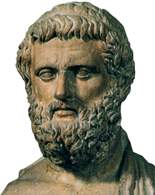More People of Greece
More Topic Categories
Related Destinations
Solon (~-639 - ~-559)
 Solon was an important Athenian legislator, philosopher, poet and is one of the Seven Wise Men of Ancient Greece.
Solon was an important Athenian legislator, philosopher, poet and is one of the Seven Wise Men of Ancient Greece.He was born around 639 BC in Athens to a wealthy and noble family which was supposedly from the lineage of the mythical King of Athens, Kodros. He received excellent education thanks to his father. When Solon lost his fortune, he turned to trading and visited Egypt and Asia Minor. During his travels, he studied the foreign way of living and the laws, as well as the political and financial life of the countries. Based on his experiences, he later used them to reform the social and financial life of his country.
In 594 BC, after a long term and brutal revolt of the citizens against the nobility of Athens, Solon was asked by both sides to create a new set of laws and was given considerable power. During that year, he was elected Archon by the Athenian demos and not by Areios Pagos, the High Court of Appeal, as the Athenian constitution demanded.
Solon’s laws were very bold and radical, depicting the magnitude of the crisis that Athens suffered from. They were based on inequality rather than equality, and were meant to avoid civil war and the dissolution of the political society of Athens by keeping the societal hierarchy. Although the inequality may seem shocking today, it should be regarded within the context of that period and the needs of Athens at that time. In his reformation, Solon erased the debts of all citizens to the city and liberated anyone who had become a slave because of owing money to Athens. He clearly defined the various social classes, stating who could be placed in office, the taxes of each class, etc. He also reformed the judicial system and turned it towards democratization and the control of power. More specifically, he gave the right to everyone (and not just the victim) to accuse someone of unlawfulness and bring him to the Areios Pagos, even an archon. He also created a new court, Iliaia, which would act as a counterbalance to the overpowered Areios Pagos.
In general, Solon reformed the public, civil and penal law completely. His laws were probably enacted in 592 BC and were written on square, wooden steles, which could revolve around an axis, which is why they were named Axes. Solon’s reformation created the basis for the evolution of law, and the political, social and financial life of Athens. He is now considered the father of civil law.
After he completed his work, Solon went into self – exile for ten years, so he would not be asked to change anything or be involved in the application of the laws. This action could be considered the first time a distinction between legislative and executive power is noted. When he returned to Athens, he realized it had flourished thanks to his laws and later died content for his contribution.
See Also:
 Athens Photos
Athens Photos
 Santorini Photos
Santorini Photos
 Crete Photos
Crete Photos
 Meteora Photos
Meteora Photos
 Corfu Photos
Corfu Photos


